Governance, Risk, and Ethics Analysis: Burberry Case Study Report
VerifiedAdded on 2020/07/22
|20
|6776
|110
Report
AI Summary
This report provides a comprehensive analysis of the corporate governance, risk, and ethical challenges faced by Burberry. The study begins with an introduction outlining the purpose and importance of the analysis, followed by a background section detailing Burberry's organizational structure, including its board of directors and committees. The report then describes key events and corporate governance issues, such as board ineffectiveness, lack of risk management, and insufficient internal control. It applies agency and stakeholder theories to understand the impact of these issues on shareholders and stakeholders. The report also examines Burberry's responses to these challenges, including discussions of CSR and environmental concerns. The conclusion summarizes key findings and offers recommendations for improved governance, risk management, and ethical practices within the company.
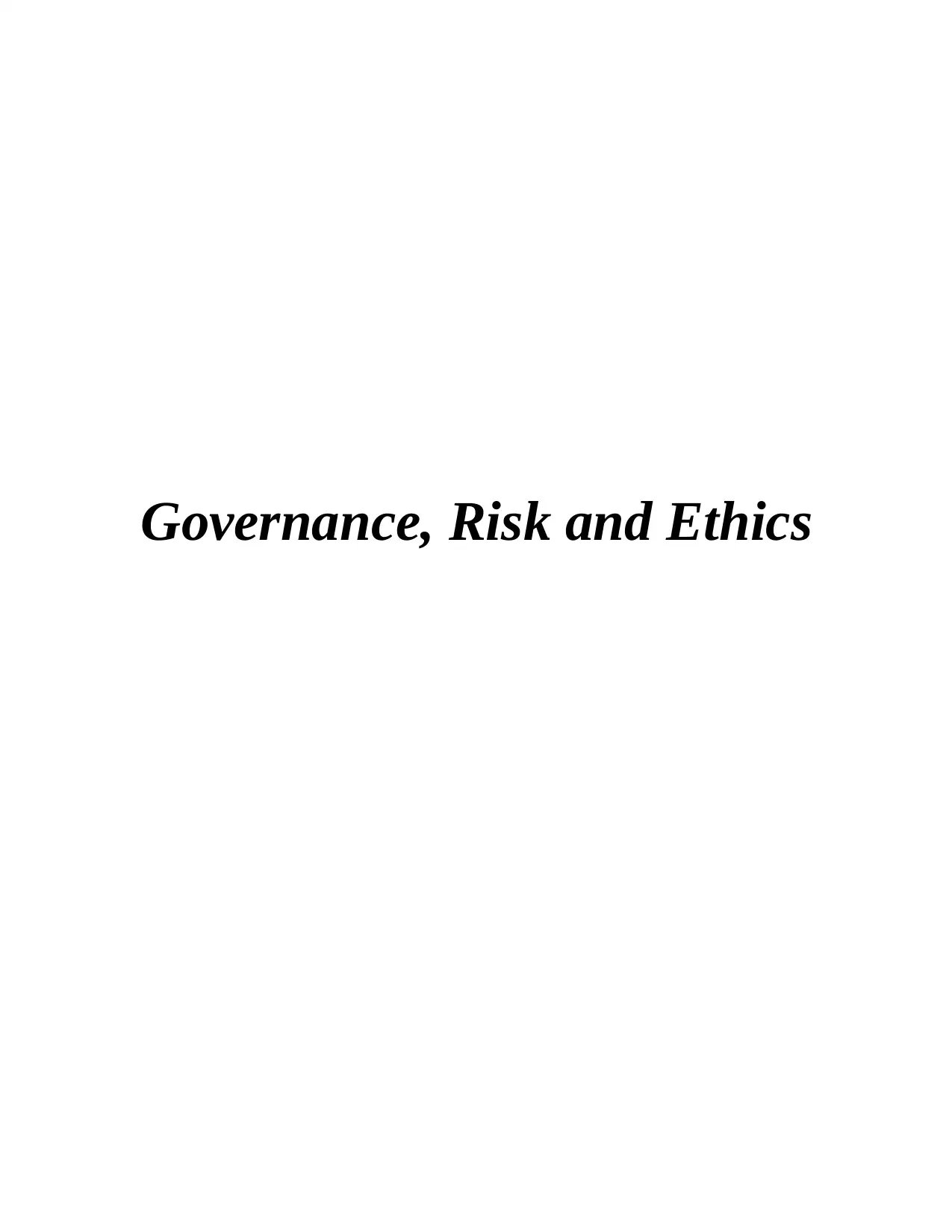
Governance, Risk and Ethics
Paraphrase This Document
Need a fresh take? Get an instant paraphrase of this document with our AI Paraphraser
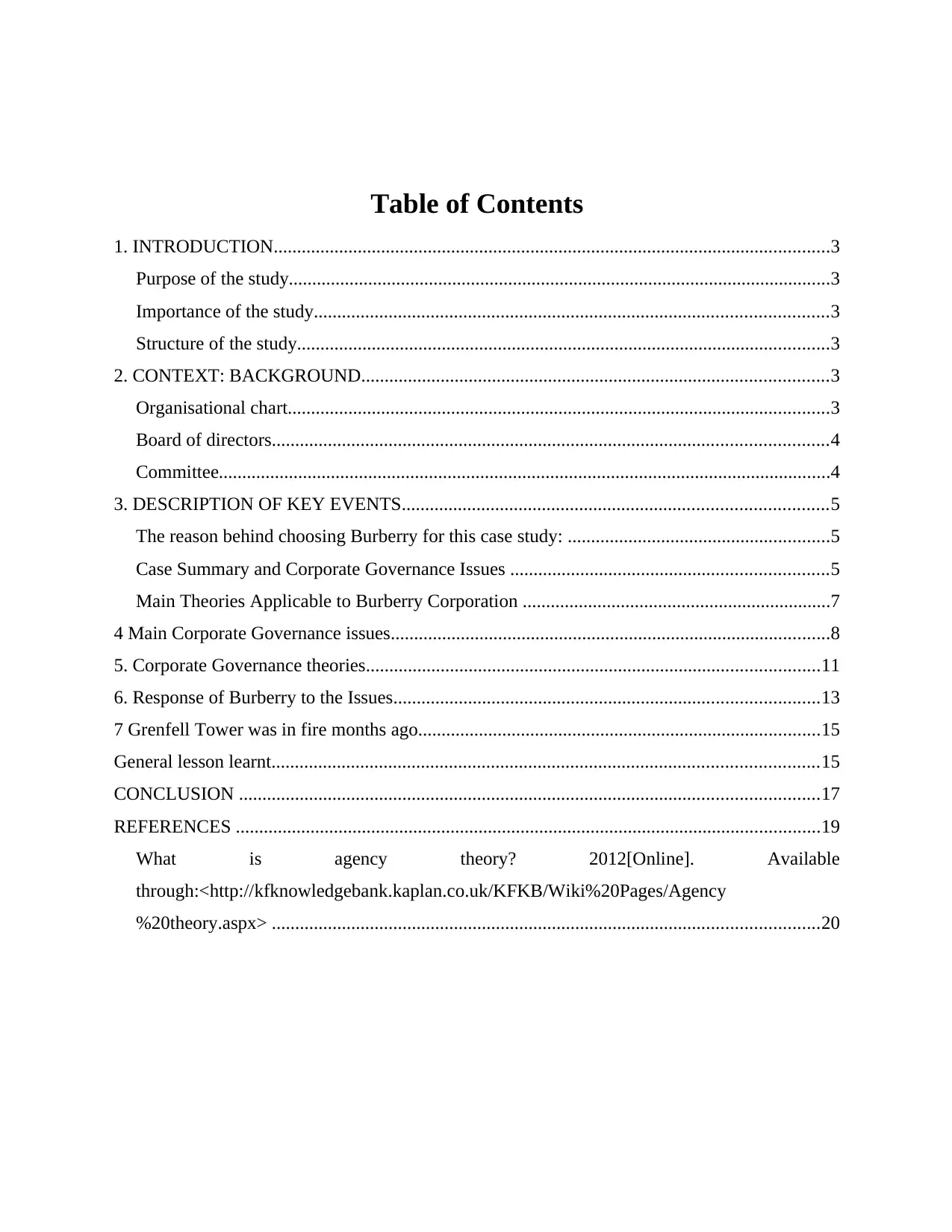
Table of Contents
1. INTRODUCTION.......................................................................................................................3
Purpose of the study....................................................................................................................3
Importance of the study..............................................................................................................3
Structure of the study..................................................................................................................3
2. CONTEXT: BACKGROUND....................................................................................................3
Organisational chart....................................................................................................................3
Board of directors.......................................................................................................................4
Committee...................................................................................................................................4
3. DESCRIPTION OF KEY EVENTS...........................................................................................5
The reason behind choosing Burberry for this case study: ........................................................5
Case Summary and Corporate Governance Issues ....................................................................5
Main Theories Applicable to Burberry Corporation ..................................................................7
4 Main Corporate Governance issues..............................................................................................8
5. Corporate Governance theories.................................................................................................11
6. Response of Burberry to the Issues...........................................................................................13
7 Grenfell Tower was in fire months ago......................................................................................15
General lesson learnt.....................................................................................................................15
CONCLUSION ............................................................................................................................17
REFERENCES .............................................................................................................................19
What is agency theory? 2012[Online]. Available
through:<http://kfknowledgebank.kaplan.co.uk/KFKB/Wiki%20Pages/Agency
%20theory.aspx> .....................................................................................................................20
1. INTRODUCTION.......................................................................................................................3
Purpose of the study....................................................................................................................3
Importance of the study..............................................................................................................3
Structure of the study..................................................................................................................3
2. CONTEXT: BACKGROUND....................................................................................................3
Organisational chart....................................................................................................................3
Board of directors.......................................................................................................................4
Committee...................................................................................................................................4
3. DESCRIPTION OF KEY EVENTS...........................................................................................5
The reason behind choosing Burberry for this case study: ........................................................5
Case Summary and Corporate Governance Issues ....................................................................5
Main Theories Applicable to Burberry Corporation ..................................................................7
4 Main Corporate Governance issues..............................................................................................8
5. Corporate Governance theories.................................................................................................11
6. Response of Burberry to the Issues...........................................................................................13
7 Grenfell Tower was in fire months ago......................................................................................15
General lesson learnt.....................................................................................................................15
CONCLUSION ............................................................................................................................17
REFERENCES .............................................................................................................................19
What is agency theory? 2012[Online]. Available
through:<http://kfknowledgebank.kaplan.co.uk/KFKB/Wiki%20Pages/Agency
%20theory.aspx> .....................................................................................................................20
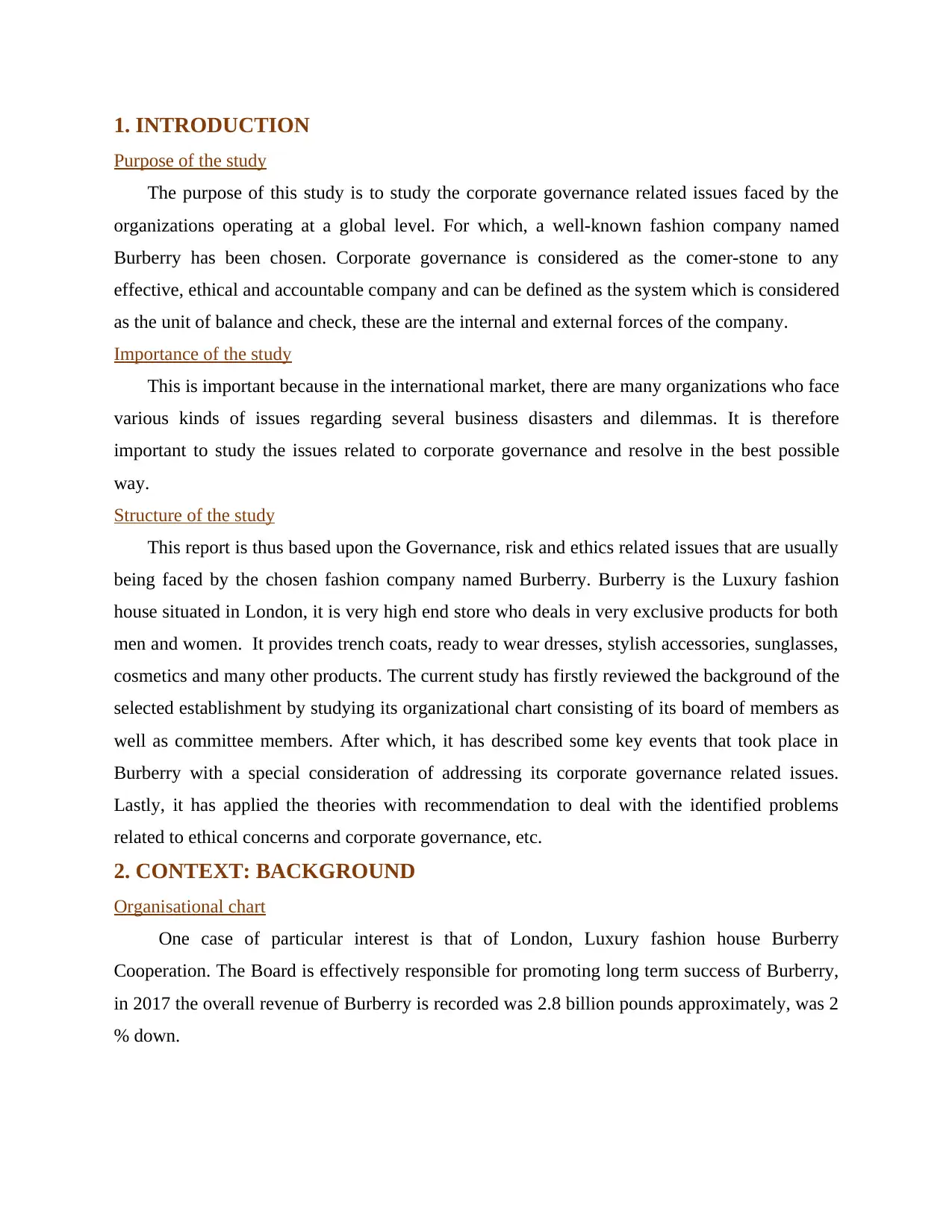
1. INTRODUCTION
Purpose of the study
The purpose of this study is to study the corporate governance related issues faced by the
organizations operating at a global level. For which, a well-known fashion company named
Burberry has been chosen. Corporate governance is considered as the comer-stone to any
effective, ethical and accountable company and can be defined as the system which is considered
as the unit of balance and check, these are the internal and external forces of the company.
Importance of the study
This is important because in the international market, there are many organizations who face
various kinds of issues regarding several business disasters and dilemmas. It is therefore
important to study the issues related to corporate governance and resolve in the best possible
way.
Structure of the study
This report is thus based upon the Governance, risk and ethics related issues that are usually
being faced by the chosen fashion company named Burberry. Burberry is the Luxury fashion
house situated in London, it is very high end store who deals in very exclusive products for both
men and women. It provides trench coats, ready to wear dresses, stylish accessories, sunglasses,
cosmetics and many other products. The current study has firstly reviewed the background of the
selected establishment by studying its organizational chart consisting of its board of members as
well as committee members. After which, it has described some key events that took place in
Burberry with a special consideration of addressing its corporate governance related issues.
Lastly, it has applied the theories with recommendation to deal with the identified problems
related to ethical concerns and corporate governance, etc.
2. CONTEXT: BACKGROUND
Organisational chart
One case of particular interest is that of London, Luxury fashion house Burberry
Cooperation. The Board is effectively responsible for promoting long term success of Burberry,
in 2017 the overall revenue of Burberry is recorded was 2.8 billion pounds approximately, was 2
% down.
Purpose of the study
The purpose of this study is to study the corporate governance related issues faced by the
organizations operating at a global level. For which, a well-known fashion company named
Burberry has been chosen. Corporate governance is considered as the comer-stone to any
effective, ethical and accountable company and can be defined as the system which is considered
as the unit of balance and check, these are the internal and external forces of the company.
Importance of the study
This is important because in the international market, there are many organizations who face
various kinds of issues regarding several business disasters and dilemmas. It is therefore
important to study the issues related to corporate governance and resolve in the best possible
way.
Structure of the study
This report is thus based upon the Governance, risk and ethics related issues that are usually
being faced by the chosen fashion company named Burberry. Burberry is the Luxury fashion
house situated in London, it is very high end store who deals in very exclusive products for both
men and women. It provides trench coats, ready to wear dresses, stylish accessories, sunglasses,
cosmetics and many other products. The current study has firstly reviewed the background of the
selected establishment by studying its organizational chart consisting of its board of members as
well as committee members. After which, it has described some key events that took place in
Burberry with a special consideration of addressing its corporate governance related issues.
Lastly, it has applied the theories with recommendation to deal with the identified problems
related to ethical concerns and corporate governance, etc.
2. CONTEXT: BACKGROUND
Organisational chart
One case of particular interest is that of London, Luxury fashion house Burberry
Cooperation. The Board is effectively responsible for promoting long term success of Burberry,
in 2017 the overall revenue of Burberry is recorded was 2.8 billion pounds approximately, was 2
% down.
⊘ This is a preview!⊘
Do you want full access?
Subscribe today to unlock all pages.

Trusted by 1+ million students worldwide
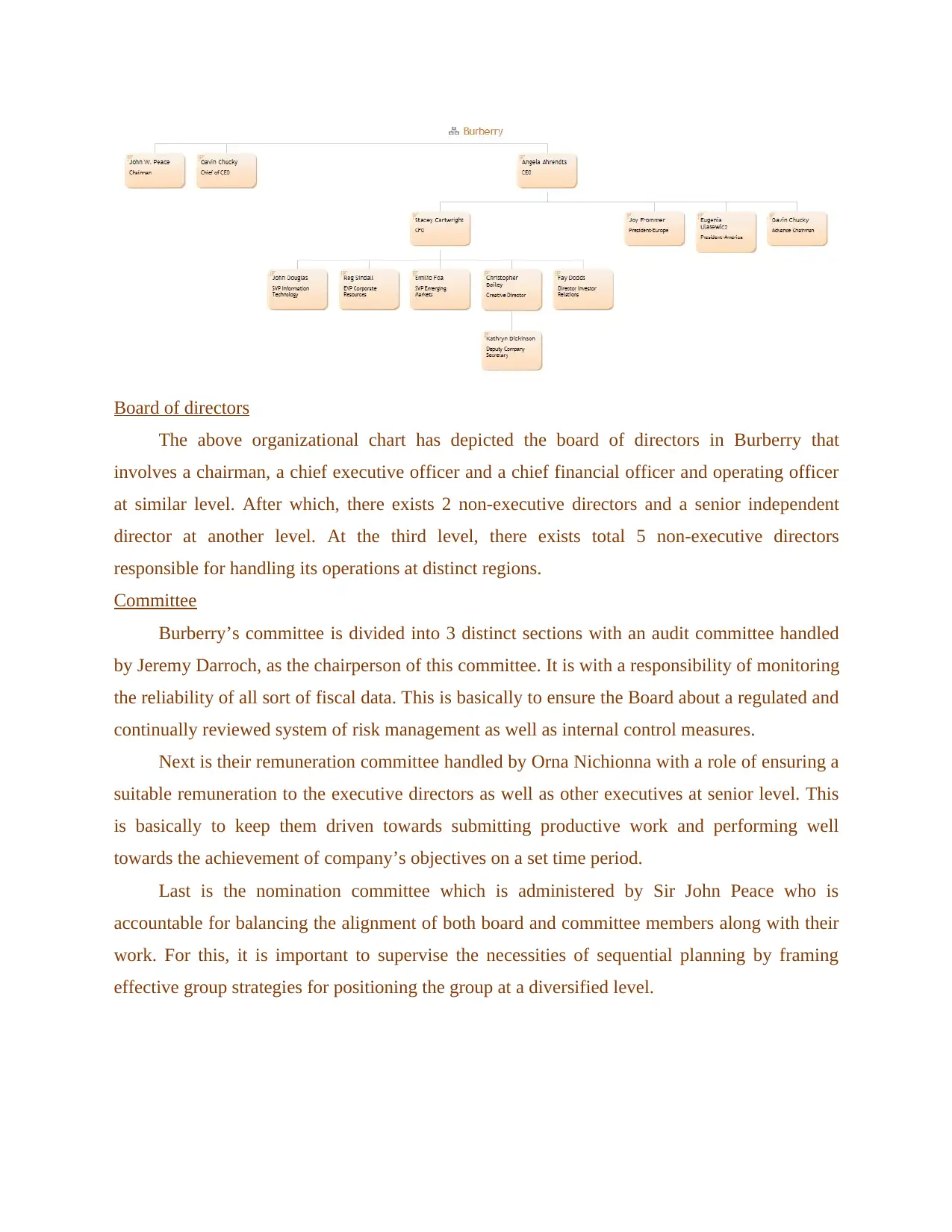
Board of directors
The above organizational chart has depicted the board of directors in Burberry that
involves a chairman, a chief executive officer and a chief financial officer and operating officer
at similar level. After which, there exists 2 non-executive directors and a senior independent
director at another level. At the third level, there exists total 5 non-executive directors
responsible for handling its operations at distinct regions.
Committee
Burberry’s committee is divided into 3 distinct sections with an audit committee handled
by Jeremy Darroch, as the chairperson of this committee. It is with a responsibility of monitoring
the reliability of all sort of fiscal data. This is basically to ensure the Board about a regulated and
continually reviewed system of risk management as well as internal control measures.
Next is their remuneration committee handled by Orna Nichionna with a role of ensuring a
suitable remuneration to the executive directors as well as other executives at senior level. This
is basically to keep them driven towards submitting productive work and performing well
towards the achievement of company’s objectives on a set time period.
Last is the nomination committee which is administered by Sir John Peace who is
accountable for balancing the alignment of both board and committee members along with their
work. For this, it is important to supervise the necessities of sequential planning by framing
effective group strategies for positioning the group at a diversified level.
The above organizational chart has depicted the board of directors in Burberry that
involves a chairman, a chief executive officer and a chief financial officer and operating officer
at similar level. After which, there exists 2 non-executive directors and a senior independent
director at another level. At the third level, there exists total 5 non-executive directors
responsible for handling its operations at distinct regions.
Committee
Burberry’s committee is divided into 3 distinct sections with an audit committee handled
by Jeremy Darroch, as the chairperson of this committee. It is with a responsibility of monitoring
the reliability of all sort of fiscal data. This is basically to ensure the Board about a regulated and
continually reviewed system of risk management as well as internal control measures.
Next is their remuneration committee handled by Orna Nichionna with a role of ensuring a
suitable remuneration to the executive directors as well as other executives at senior level. This
is basically to keep them driven towards submitting productive work and performing well
towards the achievement of company’s objectives on a set time period.
Last is the nomination committee which is administered by Sir John Peace who is
accountable for balancing the alignment of both board and committee members along with their
work. For this, it is important to supervise the necessities of sequential planning by framing
effective group strategies for positioning the group at a diversified level.
Paraphrase This Document
Need a fresh take? Get an instant paraphrase of this document with our AI Paraphraser
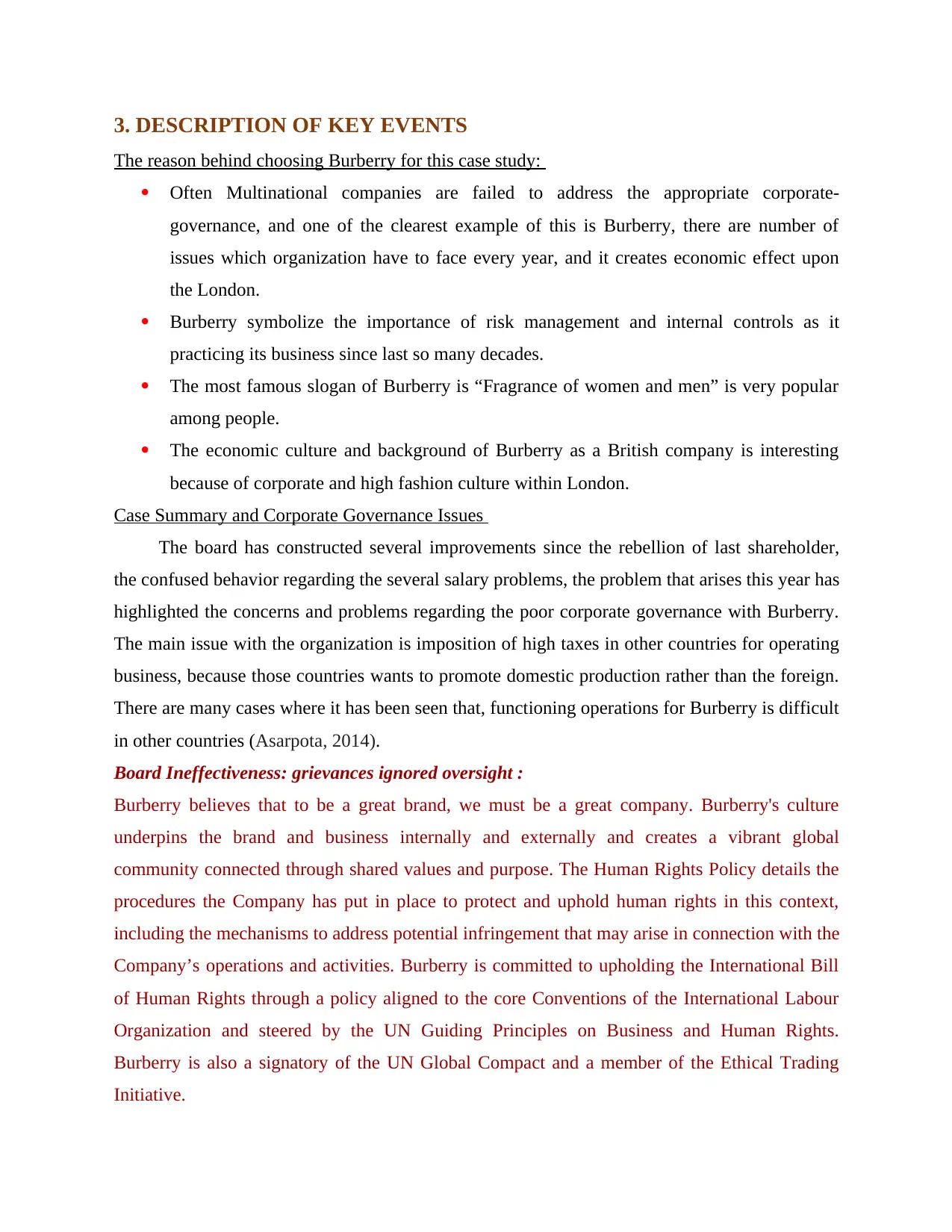
3. DESCRIPTION OF KEY EVENTS
The reason behind choosing Burberry for this case study:
Often Multinational companies are failed to address the appropriate corporate-
governance, and one of the clearest example of this is Burberry, there are number of
issues which organization have to face every year, and it creates economic effect upon
the London.
Burberry symbolize the importance of risk management and internal controls as it
practicing its business since last so many decades.
The most famous slogan of Burberry is “Fragrance of women and men” is very popular
among people.
The economic culture and background of Burberry as a British company is interesting
because of corporate and high fashion culture within London.
Case Summary and Corporate Governance Issues
The board has constructed several improvements since the rebellion of last shareholder,
the confused behavior regarding the several salary problems, the problem that arises this year has
highlighted the concerns and problems regarding the poor corporate governance with Burberry.
The main issue with the organization is imposition of high taxes in other countries for operating
business, because those countries wants to promote domestic production rather than the foreign.
There are many cases where it has been seen that, functioning operations for Burberry is difficult
in other countries (Asarpota, 2014).
Board Ineffectiveness: grievances ignored oversight :
Burberry believes that to be a great brand, we must be a great company. Burberry's culture
underpins the brand and business internally and externally and creates a vibrant global
community connected through shared values and purpose. The Human Rights Policy details the
procedures the Company has put in place to protect and uphold human rights in this context,
including the mechanisms to address potential infringement that may arise in connection with the
Company’s operations and activities. Burberry is committed to upholding the International Bill
of Human Rights through a policy aligned to the core Conventions of the International Labour
Organization and steered by the UN Guiding Principles on Business and Human Rights.
Burberry is also a signatory of the UN Global Compact and a member of the Ethical Trading
Initiative.
The reason behind choosing Burberry for this case study:
Often Multinational companies are failed to address the appropriate corporate-
governance, and one of the clearest example of this is Burberry, there are number of
issues which organization have to face every year, and it creates economic effect upon
the London.
Burberry symbolize the importance of risk management and internal controls as it
practicing its business since last so many decades.
The most famous slogan of Burberry is “Fragrance of women and men” is very popular
among people.
The economic culture and background of Burberry as a British company is interesting
because of corporate and high fashion culture within London.
Case Summary and Corporate Governance Issues
The board has constructed several improvements since the rebellion of last shareholder,
the confused behavior regarding the several salary problems, the problem that arises this year has
highlighted the concerns and problems regarding the poor corporate governance with Burberry.
The main issue with the organization is imposition of high taxes in other countries for operating
business, because those countries wants to promote domestic production rather than the foreign.
There are many cases where it has been seen that, functioning operations for Burberry is difficult
in other countries (Asarpota, 2014).
Board Ineffectiveness: grievances ignored oversight :
Burberry believes that to be a great brand, we must be a great company. Burberry's culture
underpins the brand and business internally and externally and creates a vibrant global
community connected through shared values and purpose. The Human Rights Policy details the
procedures the Company has put in place to protect and uphold human rights in this context,
including the mechanisms to address potential infringement that may arise in connection with the
Company’s operations and activities. Burberry is committed to upholding the International Bill
of Human Rights through a policy aligned to the core Conventions of the International Labour
Organization and steered by the UN Guiding Principles on Business and Human Rights.
Burberry is also a signatory of the UN Global Compact and a member of the Ethical Trading
Initiative.
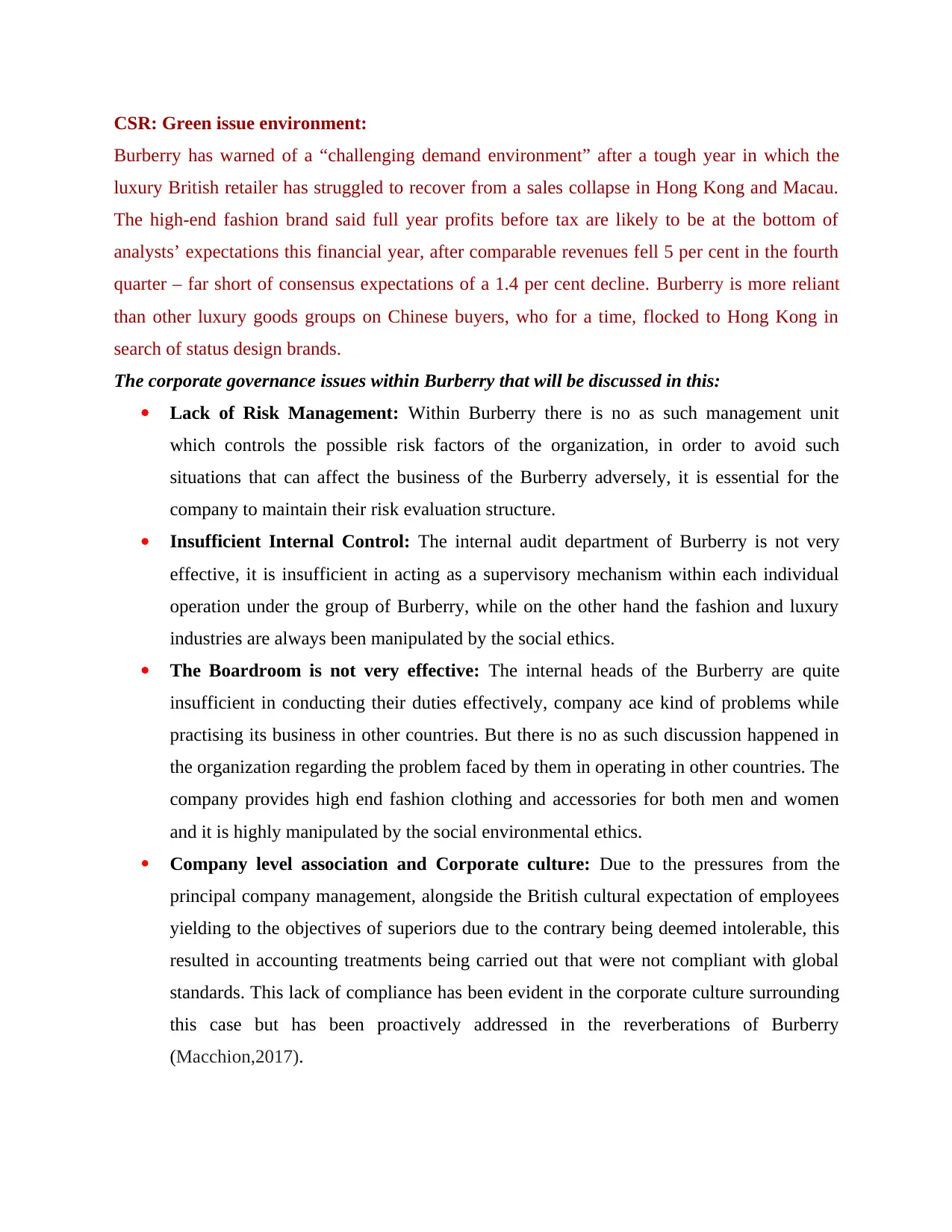
CSR: Green issue environment:
Burberry has warned of a “challenging demand environment” after a tough year in which the
luxury British retailer has struggled to recover from a sales collapse in Hong Kong and Macau.
The high-end fashion brand said full year profits before tax are likely to be at the bottom of
analysts’ expectations this financial year, after comparable revenues fell 5 per cent in the fourth
quarter – far short of consensus expectations of a 1.4 per cent decline. Burberry is more reliant
than other luxury goods groups on Chinese buyers, who for a time, flocked to Hong Kong in
search of status design brands.
The corporate governance issues within Burberry that will be discussed in this:
Lack of Risk Management: Within Burberry there is no as such management unit
which controls the possible risk factors of the organization, in order to avoid such
situations that can affect the business of the Burberry adversely, it is essential for the
company to maintain their risk evaluation structure.
Insufficient Internal Control: The internal audit department of Burberry is not very
effective, it is insufficient in acting as a supervisory mechanism within each individual
operation under the group of Burberry, while on the other hand the fashion and luxury
industries are always been manipulated by the social ethics.
The Boardroom is not very effective: The internal heads of the Burberry are quite
insufficient in conducting their duties effectively, company ace kind of problems while
practising its business in other countries. But there is no as such discussion happened in
the organization regarding the problem faced by them in operating in other countries. The
company provides high end fashion clothing and accessories for both men and women
and it is highly manipulated by the social environmental ethics.
Company level association and Corporate culture: Due to the pressures from the
principal company management, alongside the British cultural expectation of employees
yielding to the objectives of superiors due to the contrary being deemed intolerable, this
resulted in accounting treatments being carried out that were not compliant with global
standards. This lack of compliance has been evident in the corporate culture surrounding
this case but has been proactively addressed in the reverberations of Burberry
(Macchion,2017).
Burberry has warned of a “challenging demand environment” after a tough year in which the
luxury British retailer has struggled to recover from a sales collapse in Hong Kong and Macau.
The high-end fashion brand said full year profits before tax are likely to be at the bottom of
analysts’ expectations this financial year, after comparable revenues fell 5 per cent in the fourth
quarter – far short of consensus expectations of a 1.4 per cent decline. Burberry is more reliant
than other luxury goods groups on Chinese buyers, who for a time, flocked to Hong Kong in
search of status design brands.
The corporate governance issues within Burberry that will be discussed in this:
Lack of Risk Management: Within Burberry there is no as such management unit
which controls the possible risk factors of the organization, in order to avoid such
situations that can affect the business of the Burberry adversely, it is essential for the
company to maintain their risk evaluation structure.
Insufficient Internal Control: The internal audit department of Burberry is not very
effective, it is insufficient in acting as a supervisory mechanism within each individual
operation under the group of Burberry, while on the other hand the fashion and luxury
industries are always been manipulated by the social ethics.
The Boardroom is not very effective: The internal heads of the Burberry are quite
insufficient in conducting their duties effectively, company ace kind of problems while
practising its business in other countries. But there is no as such discussion happened in
the organization regarding the problem faced by them in operating in other countries. The
company provides high end fashion clothing and accessories for both men and women
and it is highly manipulated by the social environmental ethics.
Company level association and Corporate culture: Due to the pressures from the
principal company management, alongside the British cultural expectation of employees
yielding to the objectives of superiors due to the contrary being deemed intolerable, this
resulted in accounting treatments being carried out that were not compliant with global
standards. This lack of compliance has been evident in the corporate culture surrounding
this case but has been proactively addressed in the reverberations of Burberry
(Macchion,2017).
⊘ This is a preview!⊘
Do you want full access?
Subscribe today to unlock all pages.

Trusted by 1+ million students worldwide
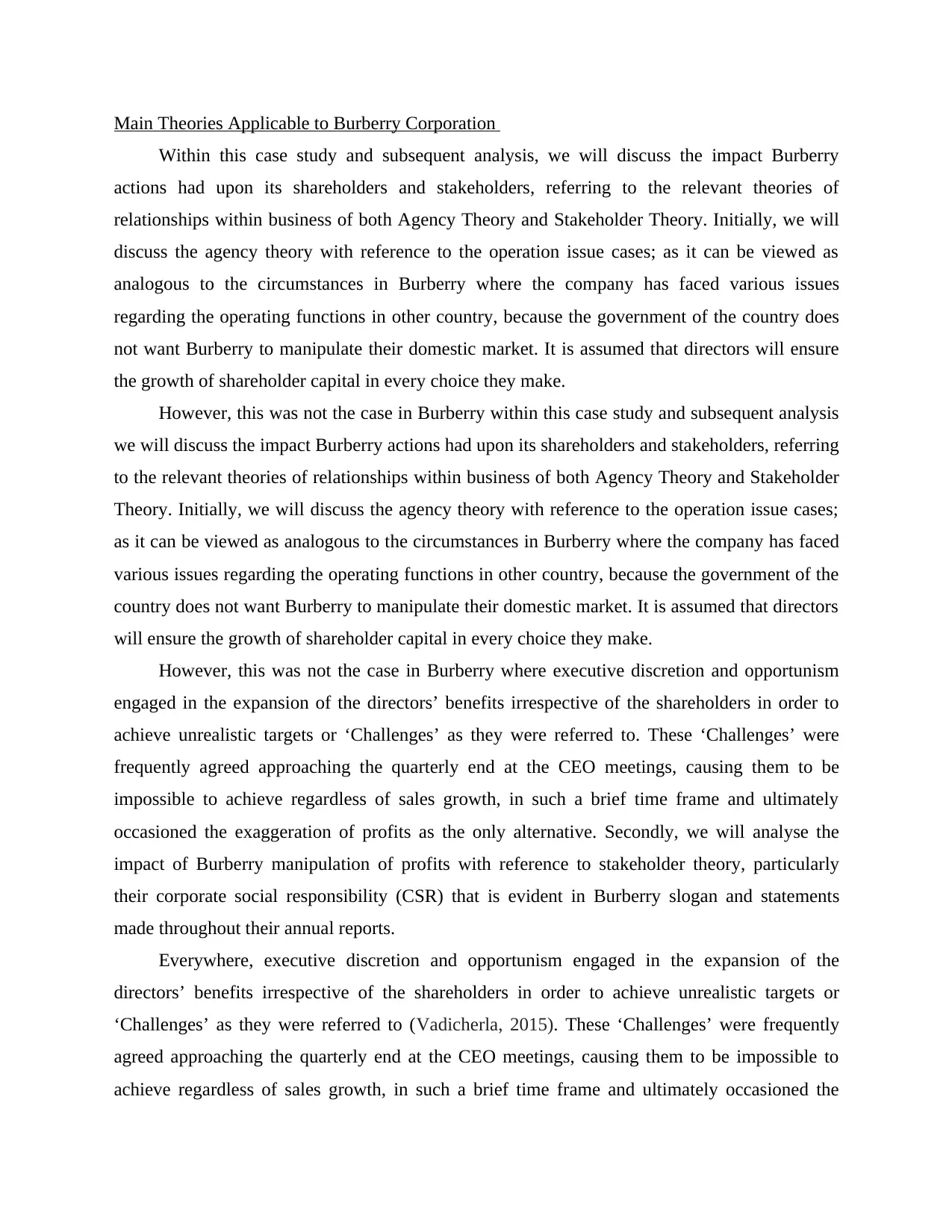
Main Theories Applicable to Burberry Corporation
Within this case study and subsequent analysis, we will discuss the impact Burberry
actions had upon its shareholders and stakeholders, referring to the relevant theories of
relationships within business of both Agency Theory and Stakeholder Theory. Initially, we will
discuss the agency theory with reference to the operation issue cases; as it can be viewed as
analogous to the circumstances in Burberry where the company has faced various issues
regarding the operating functions in other country, because the government of the country does
not want Burberry to manipulate their domestic market. It is assumed that directors will ensure
the growth of shareholder capital in every choice they make.
However, this was not the case in Burberry within this case study and subsequent analysis
we will discuss the impact Burberry actions had upon its shareholders and stakeholders, referring
to the relevant theories of relationships within business of both Agency Theory and Stakeholder
Theory. Initially, we will discuss the agency theory with reference to the operation issue cases;
as it can be viewed as analogous to the circumstances in Burberry where the company has faced
various issues regarding the operating functions in other country, because the government of the
country does not want Burberry to manipulate their domestic market. It is assumed that directors
will ensure the growth of shareholder capital in every choice they make.
However, this was not the case in Burberry where executive discretion and opportunism
engaged in the expansion of the directors’ benefits irrespective of the shareholders in order to
achieve unrealistic targets or ‘Challenges’ as they were referred to. These ‘Challenges’ were
frequently agreed approaching the quarterly end at the CEO meetings, causing them to be
impossible to achieve regardless of sales growth, in such a brief time frame and ultimately
occasioned the exaggeration of profits as the only alternative. Secondly, we will analyse the
impact of Burberry manipulation of profits with reference to stakeholder theory, particularly
their corporate social responsibility (CSR) that is evident in Burberry slogan and statements
made throughout their annual reports.
Everywhere, executive discretion and opportunism engaged in the expansion of the
directors’ benefits irrespective of the shareholders in order to achieve unrealistic targets or
‘Challenges’ as they were referred to (Vadicherla, 2015). These ‘Challenges’ were frequently
agreed approaching the quarterly end at the CEO meetings, causing them to be impossible to
achieve regardless of sales growth, in such a brief time frame and ultimately occasioned the
Within this case study and subsequent analysis, we will discuss the impact Burberry
actions had upon its shareholders and stakeholders, referring to the relevant theories of
relationships within business of both Agency Theory and Stakeholder Theory. Initially, we will
discuss the agency theory with reference to the operation issue cases; as it can be viewed as
analogous to the circumstances in Burberry where the company has faced various issues
regarding the operating functions in other country, because the government of the country does
not want Burberry to manipulate their domestic market. It is assumed that directors will ensure
the growth of shareholder capital in every choice they make.
However, this was not the case in Burberry within this case study and subsequent analysis
we will discuss the impact Burberry actions had upon its shareholders and stakeholders, referring
to the relevant theories of relationships within business of both Agency Theory and Stakeholder
Theory. Initially, we will discuss the agency theory with reference to the operation issue cases;
as it can be viewed as analogous to the circumstances in Burberry where the company has faced
various issues regarding the operating functions in other country, because the government of the
country does not want Burberry to manipulate their domestic market. It is assumed that directors
will ensure the growth of shareholder capital in every choice they make.
However, this was not the case in Burberry where executive discretion and opportunism
engaged in the expansion of the directors’ benefits irrespective of the shareholders in order to
achieve unrealistic targets or ‘Challenges’ as they were referred to. These ‘Challenges’ were
frequently agreed approaching the quarterly end at the CEO meetings, causing them to be
impossible to achieve regardless of sales growth, in such a brief time frame and ultimately
occasioned the exaggeration of profits as the only alternative. Secondly, we will analyse the
impact of Burberry manipulation of profits with reference to stakeholder theory, particularly
their corporate social responsibility (CSR) that is evident in Burberry slogan and statements
made throughout their annual reports.
Everywhere, executive discretion and opportunism engaged in the expansion of the
directors’ benefits irrespective of the shareholders in order to achieve unrealistic targets or
‘Challenges’ as they were referred to (Vadicherla, 2015). These ‘Challenges’ were frequently
agreed approaching the quarterly end at the CEO meetings, causing them to be impossible to
achieve regardless of sales growth, in such a brief time frame and ultimately occasioned the
Paraphrase This Document
Need a fresh take? Get an instant paraphrase of this document with our AI Paraphraser
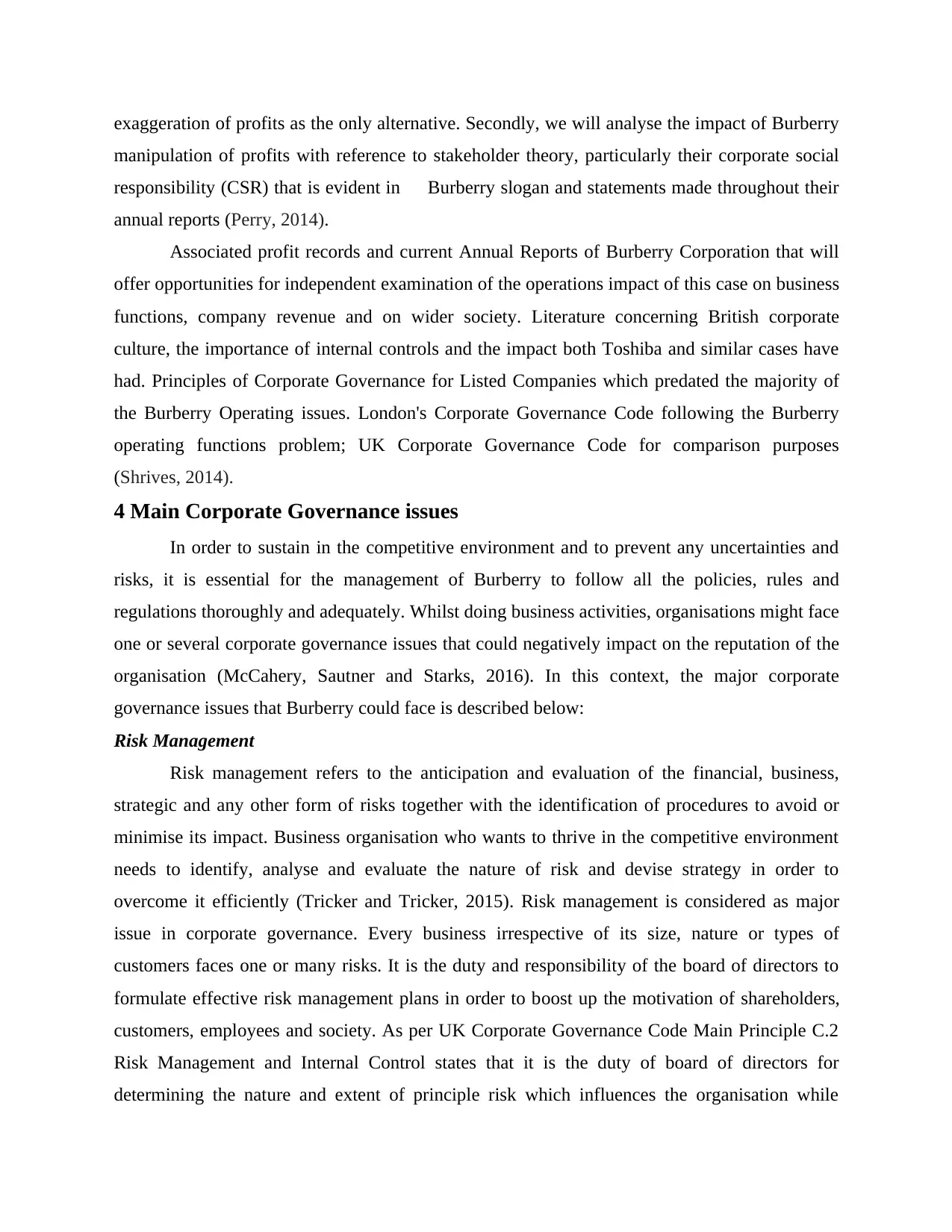
exaggeration of profits as the only alternative. Secondly, we will analyse the impact of Burberry
manipulation of profits with reference to stakeholder theory, particularly their corporate social
responsibility (CSR) that is evident in Burberry slogan and statements made throughout their
annual reports (Perry, 2014).
Associated profit records and current Annual Reports of Burberry Corporation that will
offer opportunities for independent examination of the operations impact of this case on business
functions, company revenue and on wider society. Literature concerning British corporate
culture, the importance of internal controls and the impact both Toshiba and similar cases have
had. Principles of Corporate Governance for Listed Companies which predated the majority of
the Burberry Operating issues. London's Corporate Governance Code following the Burberry
operating functions problem; UK Corporate Governance Code for comparison purposes
(Shrives, 2014).
4 Main Corporate Governance issues
In order to sustain in the competitive environment and to prevent any uncertainties and
risks, it is essential for the management of Burberry to follow all the policies, rules and
regulations thoroughly and adequately. Whilst doing business activities, organisations might face
one or several corporate governance issues that could negatively impact on the reputation of the
organisation (McCahery, Sautner and Starks, 2016). In this context, the major corporate
governance issues that Burberry could face is described below:
Risk Management
Risk management refers to the anticipation and evaluation of the financial, business,
strategic and any other form of risks together with the identification of procedures to avoid or
minimise its impact. Business organisation who wants to thrive in the competitive environment
needs to identify, analyse and evaluate the nature of risk and devise strategy in order to
overcome it efficiently (Tricker and Tricker, 2015). Risk management is considered as major
issue in corporate governance. Every business irrespective of its size, nature or types of
customers faces one or many risks. It is the duty and responsibility of the board of directors to
formulate effective risk management plans in order to boost up the motivation of shareholders,
customers, employees and society. As per UK Corporate Governance Code Main Principle C.2
Risk Management and Internal Control states that it is the duty of board of directors for
determining the nature and extent of principle risk which influences the organisation while
manipulation of profits with reference to stakeholder theory, particularly their corporate social
responsibility (CSR) that is evident in Burberry slogan and statements made throughout their
annual reports (Perry, 2014).
Associated profit records and current Annual Reports of Burberry Corporation that will
offer opportunities for independent examination of the operations impact of this case on business
functions, company revenue and on wider society. Literature concerning British corporate
culture, the importance of internal controls and the impact both Toshiba and similar cases have
had. Principles of Corporate Governance for Listed Companies which predated the majority of
the Burberry Operating issues. London's Corporate Governance Code following the Burberry
operating functions problem; UK Corporate Governance Code for comparison purposes
(Shrives, 2014).
4 Main Corporate Governance issues
In order to sustain in the competitive environment and to prevent any uncertainties and
risks, it is essential for the management of Burberry to follow all the policies, rules and
regulations thoroughly and adequately. Whilst doing business activities, organisations might face
one or several corporate governance issues that could negatively impact on the reputation of the
organisation (McCahery, Sautner and Starks, 2016). In this context, the major corporate
governance issues that Burberry could face is described below:
Risk Management
Risk management refers to the anticipation and evaluation of the financial, business,
strategic and any other form of risks together with the identification of procedures to avoid or
minimise its impact. Business organisation who wants to thrive in the competitive environment
needs to identify, analyse and evaluate the nature of risk and devise strategy in order to
overcome it efficiently (Tricker and Tricker, 2015). Risk management is considered as major
issue in corporate governance. Every business irrespective of its size, nature or types of
customers faces one or many risks. It is the duty and responsibility of the board of directors to
formulate effective risk management plans in order to boost up the motivation of shareholders,
customers, employees and society. As per UK Corporate Governance Code Main Principle C.2
Risk Management and Internal Control states that it is the duty of board of directors for
determining the nature and extent of principle risk which influences the organisation while
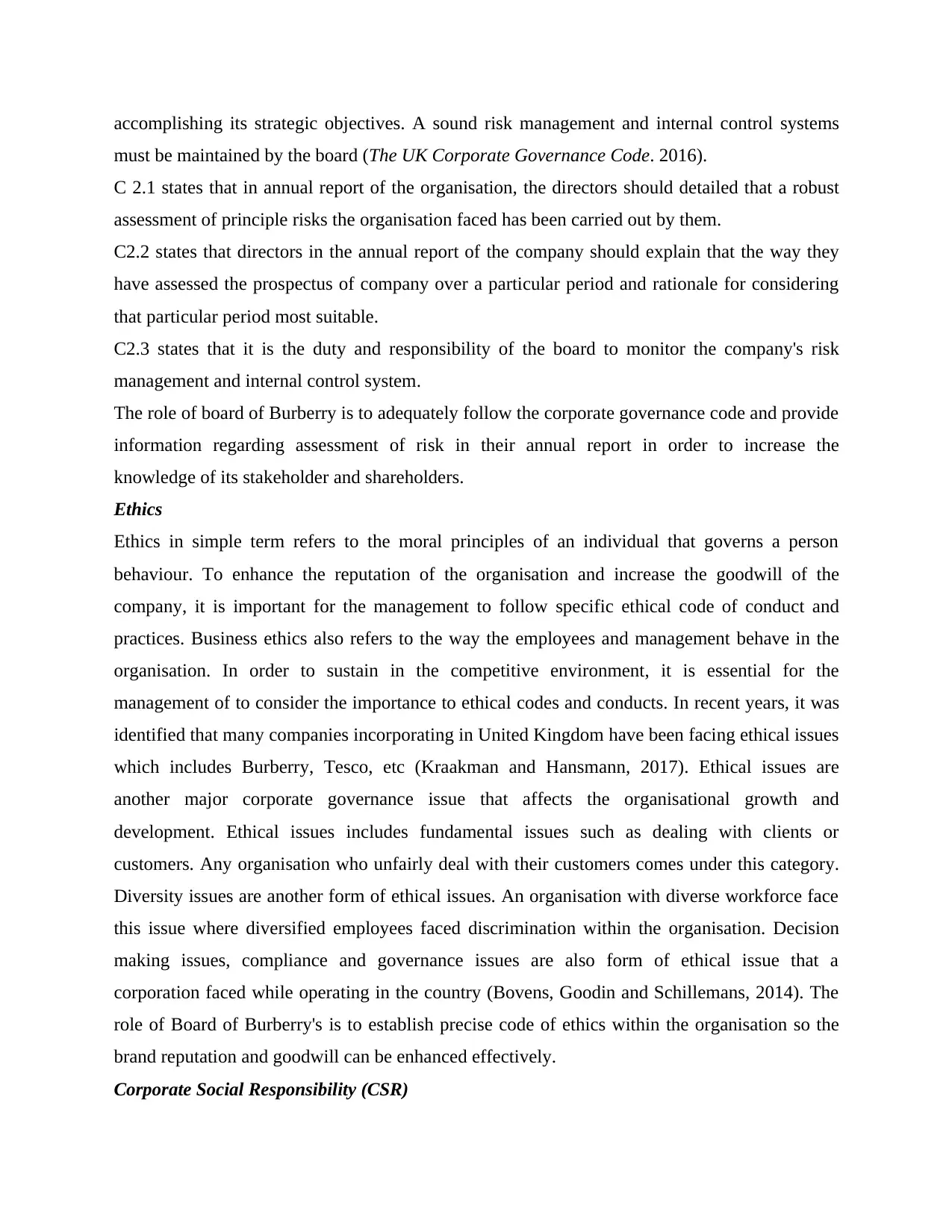
accomplishing its strategic objectives. A sound risk management and internal control systems
must be maintained by the board (The UK Corporate Governance Code. 2016).
C 2.1 states that in annual report of the organisation, the directors should detailed that a robust
assessment of principle risks the organisation faced has been carried out by them.
C2.2 states that directors in the annual report of the company should explain that the way they
have assessed the prospectus of company over a particular period and rationale for considering
that particular period most suitable.
C2.3 states that it is the duty and responsibility of the board to monitor the company's risk
management and internal control system.
The role of board of Burberry is to adequately follow the corporate governance code and provide
information regarding assessment of risk in their annual report in order to increase the
knowledge of its stakeholder and shareholders.
Ethics
Ethics in simple term refers to the moral principles of an individual that governs a person
behaviour. To enhance the reputation of the organisation and increase the goodwill of the
company, it is important for the management to follow specific ethical code of conduct and
practices. Business ethics also refers to the way the employees and management behave in the
organisation. In order to sustain in the competitive environment, it is essential for the
management of to consider the importance to ethical codes and conducts. In recent years, it was
identified that many companies incorporating in United Kingdom have been facing ethical issues
which includes Burberry, Tesco, etc (Kraakman and Hansmann, 2017). Ethical issues are
another major corporate governance issue that affects the organisational growth and
development. Ethical issues includes fundamental issues such as dealing with clients or
customers. Any organisation who unfairly deal with their customers comes under this category.
Diversity issues are another form of ethical issues. An organisation with diverse workforce face
this issue where diversified employees faced discrimination within the organisation. Decision
making issues, compliance and governance issues are also form of ethical issue that a
corporation faced while operating in the country (Bovens, Goodin and Schillemans, 2014). The
role of Board of Burberry's is to establish precise code of ethics within the organisation so the
brand reputation and goodwill can be enhanced effectively.
Corporate Social Responsibility (CSR)
must be maintained by the board (The UK Corporate Governance Code. 2016).
C 2.1 states that in annual report of the organisation, the directors should detailed that a robust
assessment of principle risks the organisation faced has been carried out by them.
C2.2 states that directors in the annual report of the company should explain that the way they
have assessed the prospectus of company over a particular period and rationale for considering
that particular period most suitable.
C2.3 states that it is the duty and responsibility of the board to monitor the company's risk
management and internal control system.
The role of board of Burberry is to adequately follow the corporate governance code and provide
information regarding assessment of risk in their annual report in order to increase the
knowledge of its stakeholder and shareholders.
Ethics
Ethics in simple term refers to the moral principles of an individual that governs a person
behaviour. To enhance the reputation of the organisation and increase the goodwill of the
company, it is important for the management to follow specific ethical code of conduct and
practices. Business ethics also refers to the way the employees and management behave in the
organisation. In order to sustain in the competitive environment, it is essential for the
management of to consider the importance to ethical codes and conducts. In recent years, it was
identified that many companies incorporating in United Kingdom have been facing ethical issues
which includes Burberry, Tesco, etc (Kraakman and Hansmann, 2017). Ethical issues are
another major corporate governance issue that affects the organisational growth and
development. Ethical issues includes fundamental issues such as dealing with clients or
customers. Any organisation who unfairly deal with their customers comes under this category.
Diversity issues are another form of ethical issues. An organisation with diverse workforce face
this issue where diversified employees faced discrimination within the organisation. Decision
making issues, compliance and governance issues are also form of ethical issue that a
corporation faced while operating in the country (Bovens, Goodin and Schillemans, 2014). The
role of Board of Burberry's is to establish precise code of ethics within the organisation so the
brand reputation and goodwill can be enhanced effectively.
Corporate Social Responsibility (CSR)
⊘ This is a preview!⊘
Do you want full access?
Subscribe today to unlock all pages.

Trusted by 1+ million students worldwide
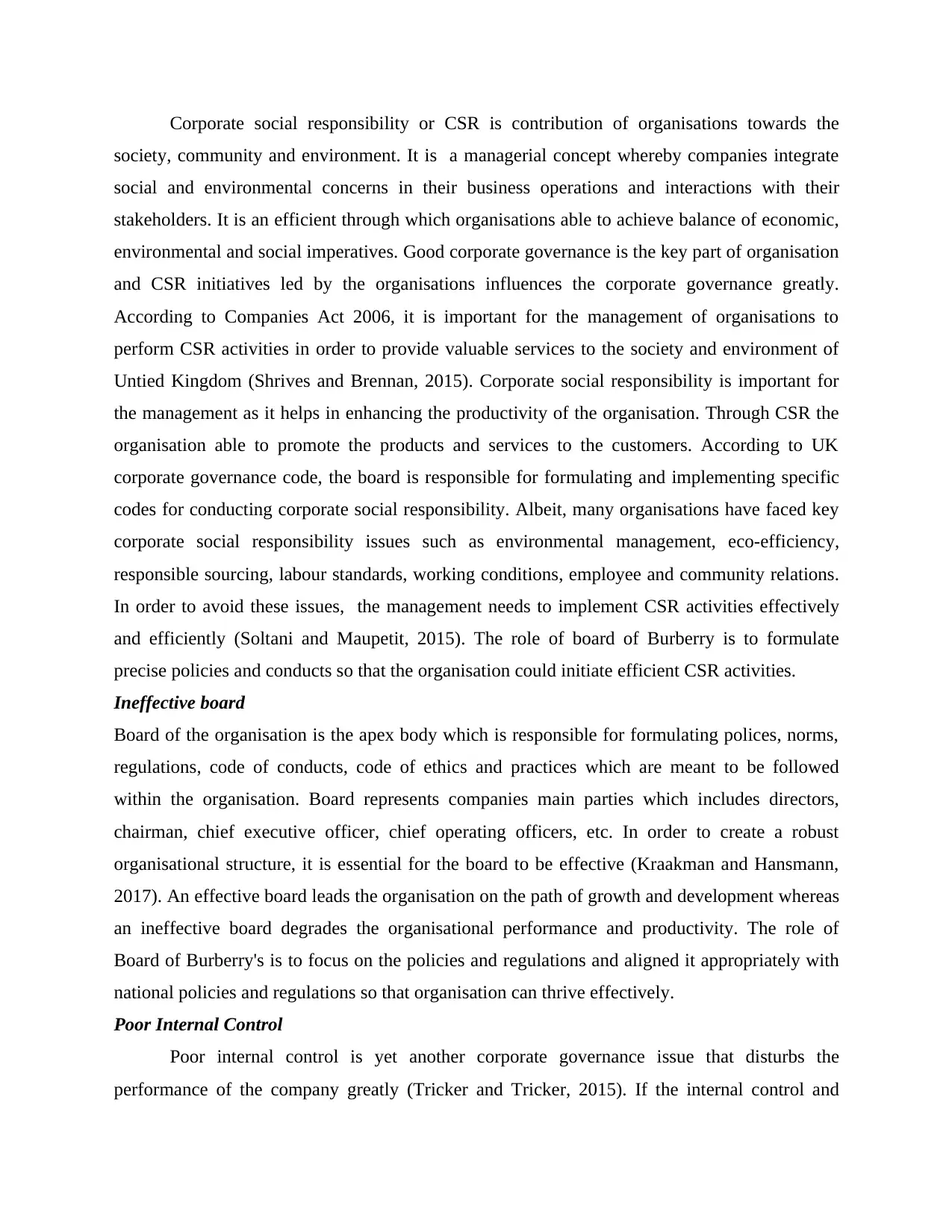
Corporate social responsibility or CSR is contribution of organisations towards the
society, community and environment. It is a managerial concept whereby companies integrate
social and environmental concerns in their business operations and interactions with their
stakeholders. It is an efficient through which organisations able to achieve balance of economic,
environmental and social imperatives. Good corporate governance is the key part of organisation
and CSR initiatives led by the organisations influences the corporate governance greatly.
According to Companies Act 2006, it is important for the management of organisations to
perform CSR activities in order to provide valuable services to the society and environment of
Untied Kingdom (Shrives and Brennan, 2015). Corporate social responsibility is important for
the management as it helps in enhancing the productivity of the organisation. Through CSR the
organisation able to promote the products and services to the customers. According to UK
corporate governance code, the board is responsible for formulating and implementing specific
codes for conducting corporate social responsibility. Albeit, many organisations have faced key
corporate social responsibility issues such as environmental management, eco-efficiency,
responsible sourcing, labour standards, working conditions, employee and community relations.
In order to avoid these issues, the management needs to implement CSR activities effectively
and efficiently (Soltani and Maupetit, 2015). The role of board of Burberry is to formulate
precise policies and conducts so that the organisation could initiate efficient CSR activities.
Ineffective board
Board of the organisation is the apex body which is responsible for formulating polices, norms,
regulations, code of conducts, code of ethics and practices which are meant to be followed
within the organisation. Board represents companies main parties which includes directors,
chairman, chief executive officer, chief operating officers, etc. In order to create a robust
organisational structure, it is essential for the board to be effective (Kraakman and Hansmann,
2017). An effective board leads the organisation on the path of growth and development whereas
an ineffective board degrades the organisational performance and productivity. The role of
Board of Burberry's is to focus on the policies and regulations and aligned it appropriately with
national policies and regulations so that organisation can thrive effectively.
Poor Internal Control
Poor internal control is yet another corporate governance issue that disturbs the
performance of the company greatly (Tricker and Tricker, 2015). If the internal control and
society, community and environment. It is a managerial concept whereby companies integrate
social and environmental concerns in their business operations and interactions with their
stakeholders. It is an efficient through which organisations able to achieve balance of economic,
environmental and social imperatives. Good corporate governance is the key part of organisation
and CSR initiatives led by the organisations influences the corporate governance greatly.
According to Companies Act 2006, it is important for the management of organisations to
perform CSR activities in order to provide valuable services to the society and environment of
Untied Kingdom (Shrives and Brennan, 2015). Corporate social responsibility is important for
the management as it helps in enhancing the productivity of the organisation. Through CSR the
organisation able to promote the products and services to the customers. According to UK
corporate governance code, the board is responsible for formulating and implementing specific
codes for conducting corporate social responsibility. Albeit, many organisations have faced key
corporate social responsibility issues such as environmental management, eco-efficiency,
responsible sourcing, labour standards, working conditions, employee and community relations.
In order to avoid these issues, the management needs to implement CSR activities effectively
and efficiently (Soltani and Maupetit, 2015). The role of board of Burberry is to formulate
precise policies and conducts so that the organisation could initiate efficient CSR activities.
Ineffective board
Board of the organisation is the apex body which is responsible for formulating polices, norms,
regulations, code of conducts, code of ethics and practices which are meant to be followed
within the organisation. Board represents companies main parties which includes directors,
chairman, chief executive officer, chief operating officers, etc. In order to create a robust
organisational structure, it is essential for the board to be effective (Kraakman and Hansmann,
2017). An effective board leads the organisation on the path of growth and development whereas
an ineffective board degrades the organisational performance and productivity. The role of
Board of Burberry's is to focus on the policies and regulations and aligned it appropriately with
national policies and regulations so that organisation can thrive effectively.
Poor Internal Control
Poor internal control is yet another corporate governance issue that disturbs the
performance of the company greatly (Tricker and Tricker, 2015). If the internal control and
Paraphrase This Document
Need a fresh take? Get an instant paraphrase of this document with our AI Paraphraser
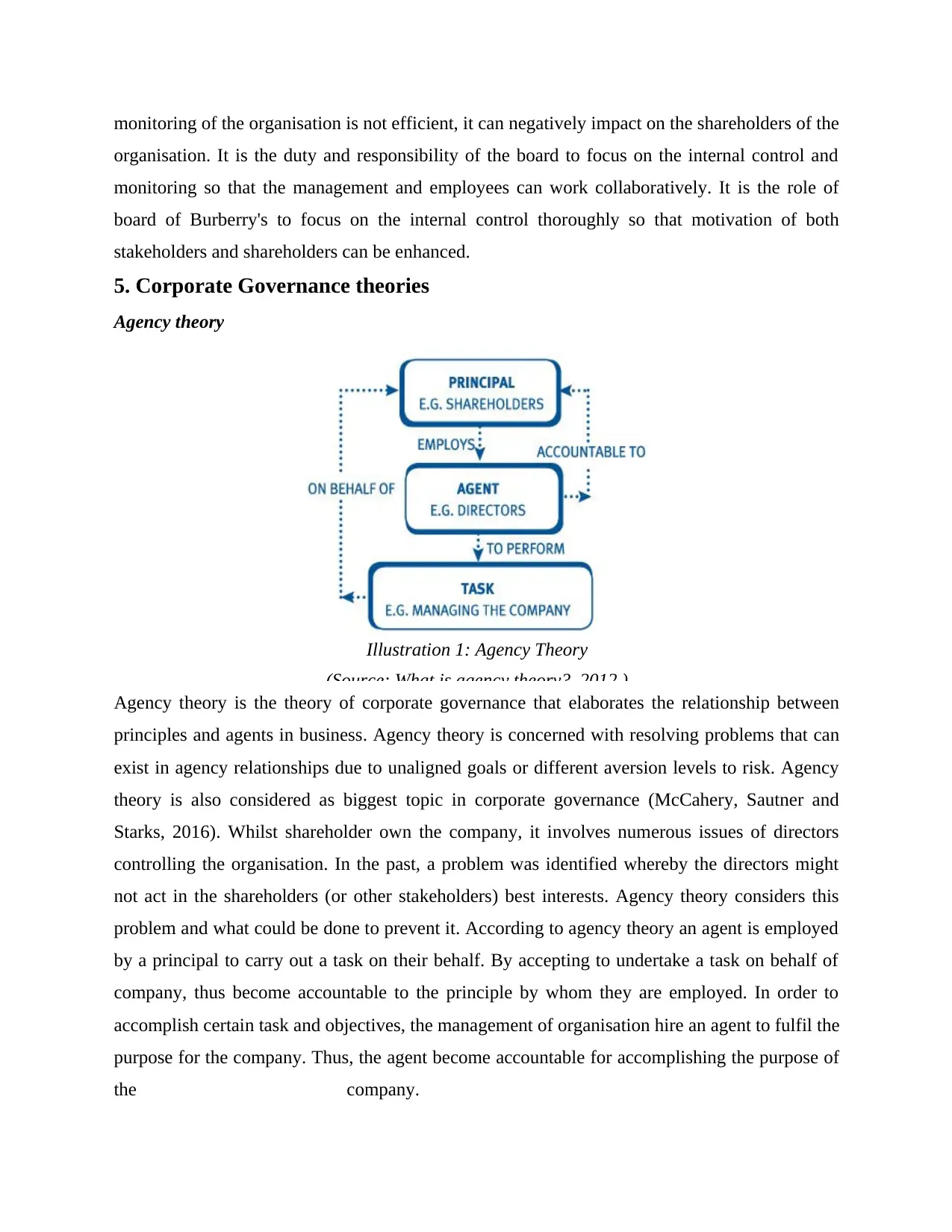
monitoring of the organisation is not efficient, it can negatively impact on the shareholders of the
organisation. It is the duty and responsibility of the board to focus on the internal control and
monitoring so that the management and employees can work collaboratively. It is the role of
board of Burberry's to focus on the internal control thoroughly so that motivation of both
stakeholders and shareholders can be enhanced.
5. Corporate Governance theories
Agency theory
Agency theory is the theory of corporate governance that elaborates the relationship between
principles and agents in business. Agency theory is concerned with resolving problems that can
exist in agency relationships due to unaligned goals or different aversion levels to risk. Agency
theory is also considered as biggest topic in corporate governance (McCahery, Sautner and
Starks, 2016). Whilst shareholder own the company, it involves numerous issues of directors
controlling the organisation. In the past, a problem was identified whereby the directors might
not act in the shareholders (or other stakeholders) best interests. Agency theory considers this
problem and what could be done to prevent it. According to agency theory an agent is employed
by a principal to carry out a task on their behalf. By accepting to undertake a task on behalf of
company, thus become accountable to the principle by whom they are employed. In order to
accomplish certain task and objectives, the management of organisation hire an agent to fulfil the
purpose for the company. Thus, the agent become accountable for accomplishing the purpose of
the company.
Illustration 1: Agency Theory
(Source: What is agency theory?, 2012 )
organisation. It is the duty and responsibility of the board to focus on the internal control and
monitoring so that the management and employees can work collaboratively. It is the role of
board of Burberry's to focus on the internal control thoroughly so that motivation of both
stakeholders and shareholders can be enhanced.
5. Corporate Governance theories
Agency theory
Agency theory is the theory of corporate governance that elaborates the relationship between
principles and agents in business. Agency theory is concerned with resolving problems that can
exist in agency relationships due to unaligned goals or different aversion levels to risk. Agency
theory is also considered as biggest topic in corporate governance (McCahery, Sautner and
Starks, 2016). Whilst shareholder own the company, it involves numerous issues of directors
controlling the organisation. In the past, a problem was identified whereby the directors might
not act in the shareholders (or other stakeholders) best interests. Agency theory considers this
problem and what could be done to prevent it. According to agency theory an agent is employed
by a principal to carry out a task on their behalf. By accepting to undertake a task on behalf of
company, thus become accountable to the principle by whom they are employed. In order to
accomplish certain task and objectives, the management of organisation hire an agent to fulfil the
purpose for the company. Thus, the agent become accountable for accomplishing the purpose of
the company.
Illustration 1: Agency Theory
(Source: What is agency theory?, 2012 )
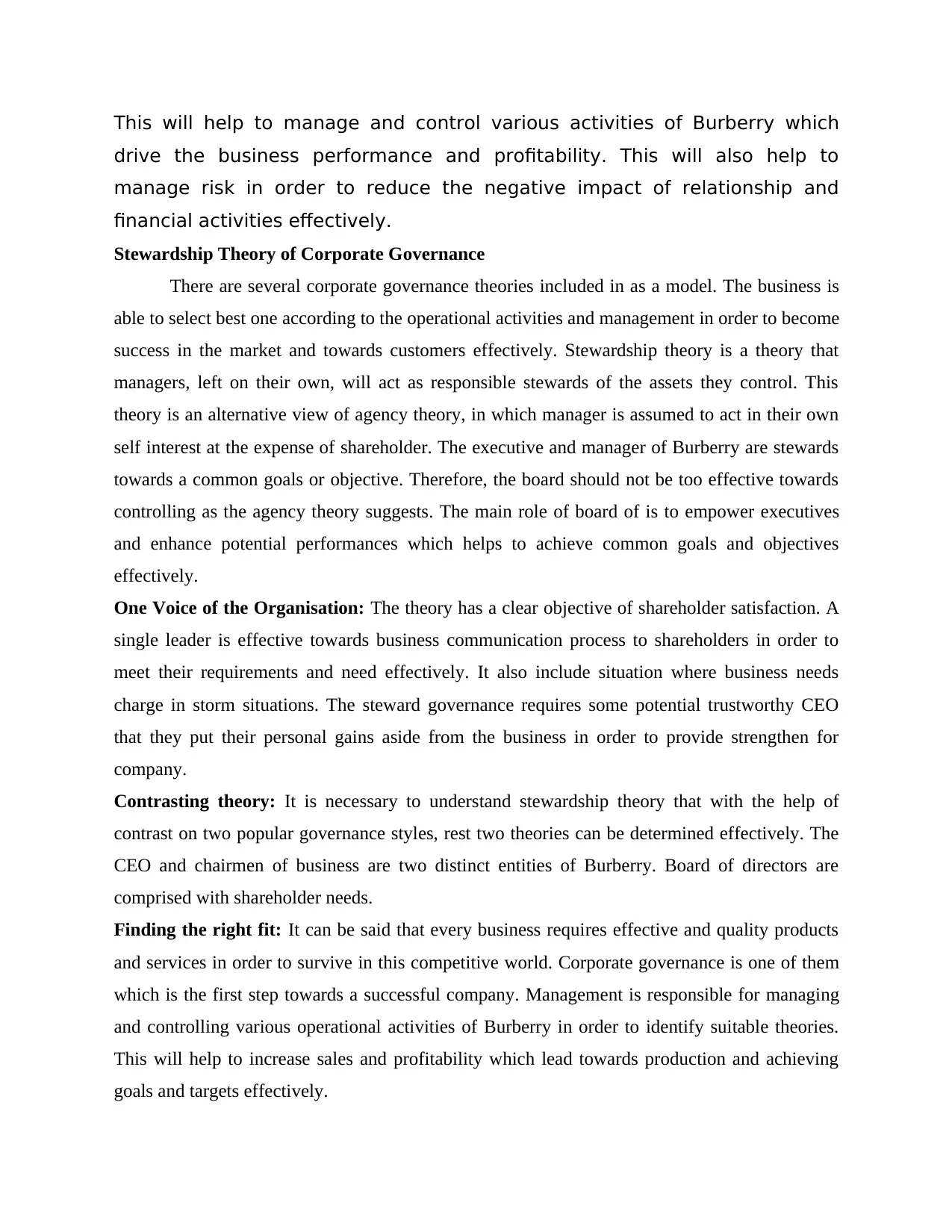
This will help to manage and control various activities of Burberry which
drive the business performance and profitability. This will also help to
manage risk in order to reduce the negative impact of relationship and
financial activities effectively.
Stewardship Theory of Corporate Governance
There are several corporate governance theories included in as a model. The business is
able to select best one according to the operational activities and management in order to become
success in the market and towards customers effectively. Stewardship theory is a theory that
managers, left on their own, will act as responsible stewards of the assets they control. This
theory is an alternative view of agency theory, in which manager is assumed to act in their own
self interest at the expense of shareholder. The executive and manager of Burberry are stewards
towards a common goals or objective. Therefore, the board should not be too effective towards
controlling as the agency theory suggests. The main role of board of is to empower executives
and enhance potential performances which helps to achieve common goals and objectives
effectively.
One Voice of the Organisation: The theory has a clear objective of shareholder satisfaction. A
single leader is effective towards business communication process to shareholders in order to
meet their requirements and need effectively. It also include situation where business needs
charge in storm situations. The steward governance requires some potential trustworthy CEO
that they put their personal gains aside from the business in order to provide strengthen for
company.
Contrasting theory: It is necessary to understand stewardship theory that with the help of
contrast on two popular governance styles, rest two theories can be determined effectively. The
CEO and chairmen of business are two distinct entities of Burberry. Board of directors are
comprised with shareholder needs.
Finding the right fit: It can be said that every business requires effective and quality products
and services in order to survive in this competitive world. Corporate governance is one of them
which is the first step towards a successful company. Management is responsible for managing
and controlling various operational activities of Burberry in order to identify suitable theories.
This will help to increase sales and profitability which lead towards production and achieving
goals and targets effectively.
drive the business performance and profitability. This will also help to
manage risk in order to reduce the negative impact of relationship and
financial activities effectively.
Stewardship Theory of Corporate Governance
There are several corporate governance theories included in as a model. The business is
able to select best one according to the operational activities and management in order to become
success in the market and towards customers effectively. Stewardship theory is a theory that
managers, left on their own, will act as responsible stewards of the assets they control. This
theory is an alternative view of agency theory, in which manager is assumed to act in their own
self interest at the expense of shareholder. The executive and manager of Burberry are stewards
towards a common goals or objective. Therefore, the board should not be too effective towards
controlling as the agency theory suggests. The main role of board of is to empower executives
and enhance potential performances which helps to achieve common goals and objectives
effectively.
One Voice of the Organisation: The theory has a clear objective of shareholder satisfaction. A
single leader is effective towards business communication process to shareholders in order to
meet their requirements and need effectively. It also include situation where business needs
charge in storm situations. The steward governance requires some potential trustworthy CEO
that they put their personal gains aside from the business in order to provide strengthen for
company.
Contrasting theory: It is necessary to understand stewardship theory that with the help of
contrast on two popular governance styles, rest two theories can be determined effectively. The
CEO and chairmen of business are two distinct entities of Burberry. Board of directors are
comprised with shareholder needs.
Finding the right fit: It can be said that every business requires effective and quality products
and services in order to survive in this competitive world. Corporate governance is one of them
which is the first step towards a successful company. Management is responsible for managing
and controlling various operational activities of Burberry in order to identify suitable theories.
This will help to increase sales and profitability which lead towards production and achieving
goals and targets effectively.
⊘ This is a preview!⊘
Do you want full access?
Subscribe today to unlock all pages.

Trusted by 1+ million students worldwide
1 out of 20
Related Documents
Your All-in-One AI-Powered Toolkit for Academic Success.
+13062052269
info@desklib.com
Available 24*7 on WhatsApp / Email
![[object Object]](/_next/static/media/star-bottom.7253800d.svg)
Unlock your academic potential
Copyright © 2020–2026 A2Z Services. All Rights Reserved. Developed and managed by ZUCOL.



